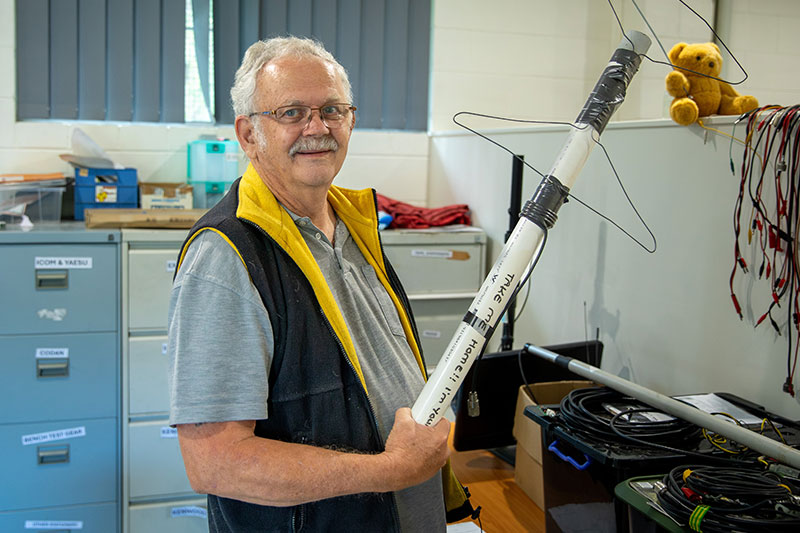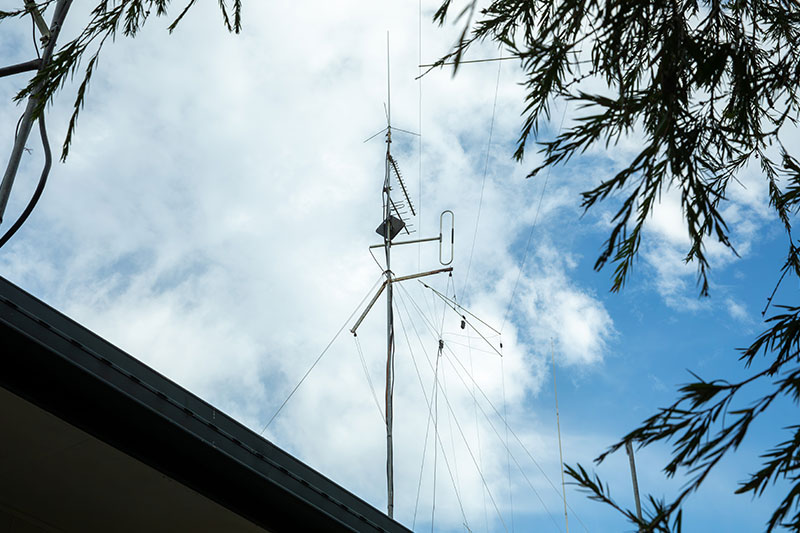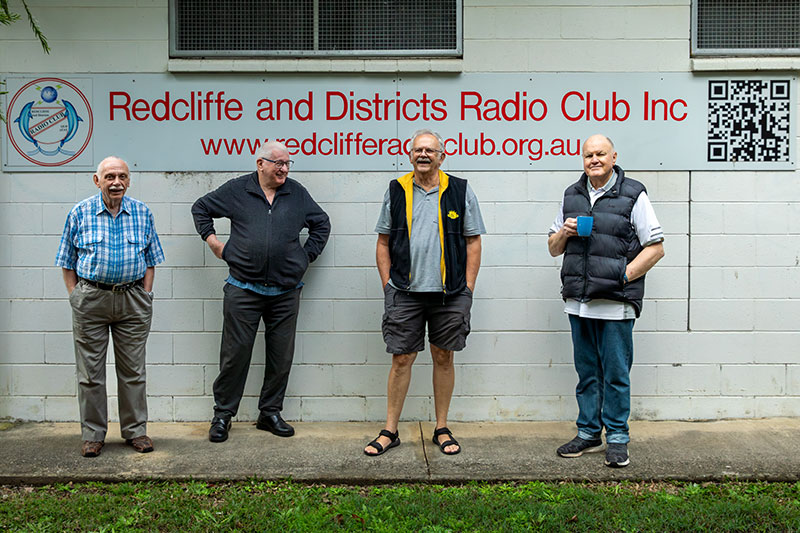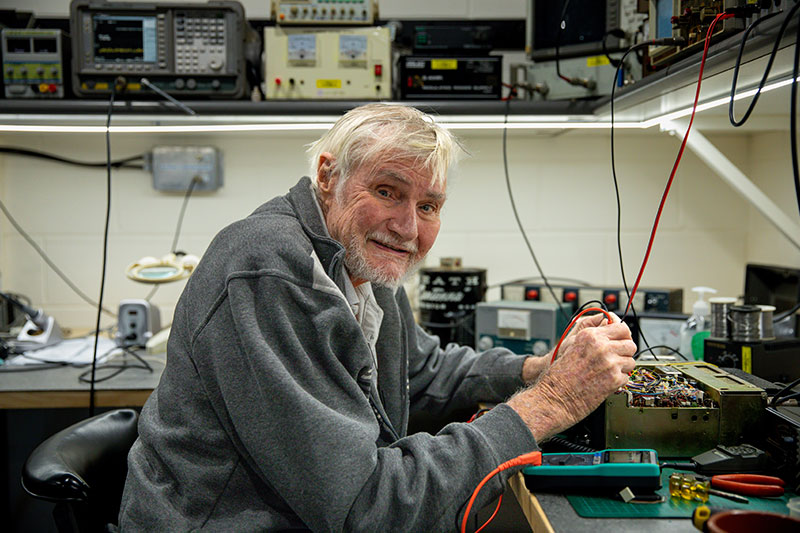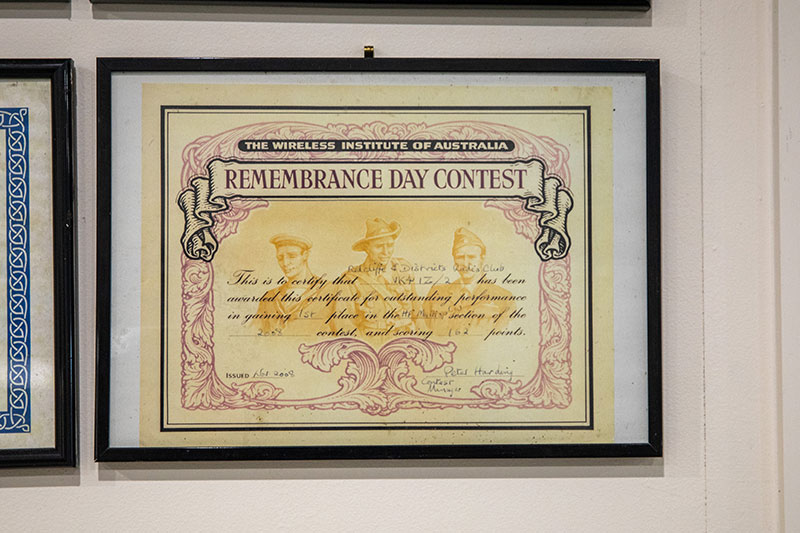5 August 2025
Banding together over radio
Army veteran and amateur (‘ham’) radio operator Jeff Lord never knows whom (or what) he’ll make contact with next.
He regularly chats with people across the globe, from the next suburb to England, Slovakia and the United States. He’s even picked up the duga radar (a.k.a. ‘Russian woodpecker’) used in missile defence by the Soviet Union.
Army veteran and ham radio operator Jeff Lord
“You are always meeting somebody different – somebody new,” the Pine Rivers RSL Sub Branch member explains.
“You can go outside, turn the radio on and listen to the bloody world.”
From Morse code to meteorites
To Jeff, it’s both the social and technical possibilities that give radio its enduring appeal.
He began dabbling in citizens band (CB) radio in 1978. Thirty years later, seeking longer-range radio capabilities, he and his son joined Redcliffe and Districts Radio Club (based in north Brisbane) and got their ham radio licences.
Now the club’s Promotions Officer, Jeff is one of an estimated 500,000 to 3,000,000 ham radio operators (‘hams’) worldwide. Hams use radio transmission to communicate non-commercially via voice, pictures, video signals, Morse code, and digital methods.
“It's one of those hobbies where there is just so much you can do,” he says.
Ham radio operators use special equipment to communicate with people all over the world
“You can build a lot of your own equipment. You can buy kits and build radios and antennas. You can experiment with building an antenna that nobody else has built before.
“We can bounce a signal off the moon or a flying aircraft. You've seen that lovely streak of light from a meteorite going through the air? We can bounce a signal off that. We can talk to the International Space Station.
“It's a technical challenge. It keeps your mind alive; it keeps you thinking.”
Radio is also, of course, an invaluable lifeline when all other communication options fail.
“When Cyclone Tracy went through Darwin in 1974, the first information out of Darwin came from amateur radios. When New Orleans got busted by Hurricane Katrina, ham radio operators were the first communication lines coming through from there,” Jeff says.
“We’re not dependent on cell towers, which fail when you have no power, or radio and TV stations, which generally get wiped. Amateur radio operators can be out and operational within an hour of a natural disaster and have comms going.”
Camaraderie on and off air
Jeff is one of many veterans at his radio club, who hail from different service branches, corps and trades.
Major John Saunders, the club’s President and an Army Reserve chaplain, has observed that “there seems to be a uniquely high percentage of military and ex-military people involved in the hobby”.
“I guess the camaraderie and the technical nature of what we do appeals to the military type,” he says.
Jeff is one of many veteran members at the Redcliffe and Districts Radio Club
To Jeff, camaraderie is one of ham radio’s most rewarding aspects.
“When you leave the military, you leave that close-knit camaraderie that you have with the members of your unit. You're lost,” Jeff says.
“With amateur radio, there’s always someone you can talk and listen to on the bands. It’s another way of getting into a group with similar interests – and values, strangely enough.”
He’s keen to set up a radio ‘net’ (scheduled on-air gathering) for veterans – a good social option for those who may find face-to-face interaction difficult.
“You can talk and the people listening have the same experiences. They’ve been through the same mill, they've had the same worries and doubts, and they can give you support.”
Ham fests, fox hunts and more
According to the Wireless Institute of Australia, there are hundreds of amateur radio clubs across the country.
Anyone can join Jeff’s club, which has an operational radio room and well-equipped test and repair bench, and regularly meets up on air and in person.
There are weekly trivia and tech nights, a monthly ‘fox hunt’ (where hams are challenged to track down transmitters hidden around the neighbourhood), ham fests (ham radio-themed markets), and competitions where hams compete to gain communication out bush or make as many contacts as possible in a given time.
The club is also active within the community, teaching kids about radio at schools and major Scouting and Girl Guide events like Jamboree on the Air (JOTA).
“At Guides Unite last year, our club ran a display and we had 200 Girl Guides and Brownies there,” Jeff says.
Redcliffe and Districts Radio Club member Charles Power
“We set up two radio stations and had electronics kits for them to play with. I helped the Guides with their communications handbooks for their badges, and we had wire antennas set up in trees. We had communications going into New Zealand and made contacts as far away as Mississippi in the USA.
“The girls were really chuffed because they'd never seen anything like what we did. A lot of them came back several times and tried other things. It was really good.”
Club members are always there for each other, too.
When Cyclone Alfred bore down on Brisbane in February 2025, members supported each other, securing homes and equipment and delivering generators to those without power.
When two members were recovering from serious illness, the club banded together to set up their radio rigs and get them back on air – even inside hospital.
“We're very much focused not only on the hobby, but also on the welfare of our members,” Jeff says.
“We have our own welfare officer – the whole box and dice. If you have an issue, you can take it to the club.”
No barriers
According to Jeff, age and ability are no barriers to amateur radio. His club’s youngest ever member was eight years old, and members with disabilities use adaptive equipment to tune in and transmit.
“Anybody can be an amateur radio operator,” he says.
A certificate from the Wireless Institute of Australia
“It doesn't cost the world to get into, though you do require a foundation licence. Most radio clubs – including ours – run courses to help you pass the exams. This year alone we've probably bought 25 or 30 new hams into the hobby.
“From there you can advance to two other licence levels, which give you more power output and more frequencies.
“It is an amazing hobby.”
More information
To learn more or find a radio club near you, visit Wireless Institute of Australia.

